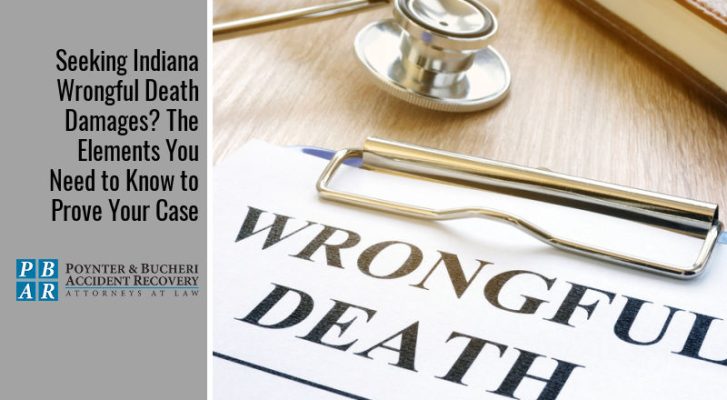
Seeking Indiana Wrongful Death Damages? The Elements You Need to Know to Prove Your Case

Perhaps the most difficult experience in life is losing a loved one, and the death of a family member is even worse when their passing is unexpected. When someone dies due to the negligence or deliberate wrongdoing of a person or company, the victim’s family can hold the liable party financially responsible through a wrongful death claim and seek Indiana wrongful death damages.
If you’ve lost a family member due to someone’s negligence, you may have many questions regarding filing a wrongful death claim. In this blog, we discuss the elements you need to prove in wrongful death cases as well as who can file, the statute of limitations in Indiana, and what damages you can receive from the liable party.
What Is Wrongful Death in Indiana?
Wrongful death is a type of lawsuit that specifically aims to hold the liable party financially responsible for a person’s unexpected passing. It differs from criminal cases, so just because someone is found liable for a person’s death does not mean that they’ll face criminal charges. These lawsuits enable the victim’s family to recover compensation associated with their loved one’s death.
Some examples of wrongful death cases include:
- Deaths caused by negligent drivers
- Medical malpractice causing a patient’s death
- Nursing home neglect and abuse leading to wrongful death
- Deaths caused by intentional violence
- Construction accidents causing a person’s death
- Defective products resulting in wrongful death
Who Can File a Wrongful Death Lawsuit in Indiana?
In Indiana, the person who can file a wrongful death claim depends on the victim’s age. If the victim was a child, a parent or legal guardian can file a wrongful death claim. One important note is that “child” in this case means that the victim was unmarried, had no dependents, and was under 20. Someone can also qualify as a child if they were unmarried, had no dependents, were younger than 23, and were enrolled in an educational program. Finally, a viable fetus, meaning the fetus could live outside of a uterus, is also considered a child.
In the event that the victim was legally an adult, it’s the responsibility of the personal representative of their estate to file the wrongful death claim. People frequently leave a family member in charge of their personal estates, but a person can appoint anyone to be their estate’s personal representative or “executor.”
Indiana Wrongful Death Statute of Limitations
Indiana’s statute of limitations refers to the amount of time a parent, guardian, or executor of an estate has to file a wrongful death lawsuit. The wrongful death statute of limitations in Indiana is two years, so you have two years after the victim’s death to file against the responsible party. If you fail to file within two years, you will not be able to recover damages from the liable party.
What Are the Elements of a Wrongful Death Case?
In order to settle or win your wrongful death claim, you need to prove certain elements in your case. These elements include:
- The defendant owed the victim a duty: A central element in wrongful death and personal injury cases is that the party you’re filing against owed the victim a duty. For example, drivers have a duty to operate their vehicles on the road safely in order to protect others.
- The defendant breached that duty: The defendant needs to have breached their duty to the victim. In wrongful death cases involving car accidents, the defendant breached their duty if they drove dangerously or broke traffic laws. If a driver operated their vehicle while intoxicated, they broke their duty to others because driving while under the influence is highly dangerous.
- The defendant’s breach caused the victim’s death: In order to hold a defendant accountable, you need to prove that their negligence or deliberate wrongdoing directly resulted in the victim’s death. For example, it takes more than proving a driver was drunk to hold them accountable for a person’s death. You need to prove that their drunk driving directly caused the victim’s death.
- The victim’s death resulted in damages: Finally, you need to be able to prove that the victim’s death caused damages. These include both monetary damages, like medical bills and funeral costs, as well as emotional damages, like pain and suffering and loss of a parent.
Indiana Wrongful Death Damages
Indiana wrongful death settlements can result in different forms of damages depending on certain factors. If the victim was a child, their parent or guardian may receive money compensating them for medical bills, funeral and burial costs, cost of counseling for a parent, guardian, or younger sibling, loss of love and companionship, loss of child’s services, and the child’s debts.
If the victim was an adult who wasn’t married and had no dependents, their estate may receive loss of love and companionship, funeral and burial costs, and medical bills.
Finally, if the victim was married and had dependents, the victim’s estate can receive loss of future earnings, loss of love and companionship, loss of a parent, funeral and burial costs, and medical bills.
Contact a Wrongful Death Attorney in Indiana
If you’ve lost a loved one due to another person’s negligence or deliberate wrongdoing, you need to contact an Indiana wrongful death attorney to assist you with your case. Although you’re not required to hire a lawyer to file a wrongful death claim, they will greatly increase your likelihood of settling or winning your case, and they’ll work to maximize the amount you’ll receive for your tragic loss.
For expert wrongful death lawyers in Indiana, contact Poynter & Bucheri Accident Recovery Attorneys at Law. We offer free case reviews where we’ll answer any of your questions regarding wrongful death cases. Call us today at 1-800-265-9881, or click here to schedule your free case review.
